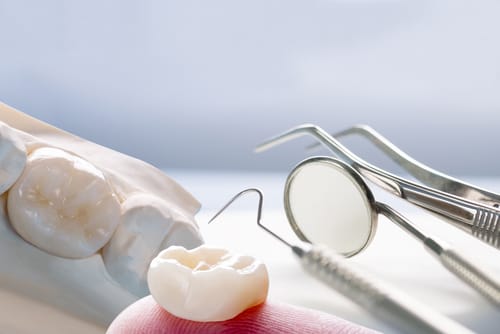Your smile is one of the first things people notice about you. A dental crown can help restore and protect a damaged tooth, improve your bite, and enhance your overall appearance. This blog will discuss everything you need to know about dental crowns. From understanding what they are and why they are necessary to the different types of crowns available and the procedure involved in getting one. We will also cover the pros and cons of dental crowns, their life expectancy, and how to care for them after the procedure. Read on to learn more about this popular dental treatment option!
Defining Dental Crowns
Dental crowns, known as tooth-shaped restorations, cover and protect damaged teeth. Not only do they restore the tooth’s size and strength, but they also enhance its appearance, alignment, and dental occlusion. These permanent solutions are crucial for safeguarding weak teeth, dental implants, or large fillings, and they can only be removed by a dentist. Dental crowns play a pivotal role in preserving dental health and ensuring the longevity of dental restorations.
The Necessity of Dental Crowns
When damaged teeth require restoration, dental crowns become necessary for protecting weak teeth and supporting dental bridges or implants. They prevent further damage to chipped or cracked teeth and are recommended for teeth with large fillings, root canal treatment, or misshapenness. As an essential part of dental care, crowns play a crucial role in dental restoration, using materials such as ceramic, gold alloy, or resin to ensure strength and durability. Their placement requires dental cement and the expertise of a dental lab or CAD/CAM technology.
Gold Crowns
Gold crowns are ideal for molars, wear-resistant, and require minimal tooth structure removal. They are less abrasive to opposing teeth and an excellent option for patients allergic to other materials. While long-lasting, their color may not be suitable for visible teeth. However, they excel at restoring chewing functionality. Gold crowns offer durability and strength, making them an excellent choice for restoring the functionality of damaged or missing teeth.
Porcelain-Fused-to-Metal Crowns
Combining the strength of metal with the aesthetics of porcelain, these crowns offer a natural tooth color with durability. Suitable for front or back teeth, they balance aesthetics and functionality. Over time, they may show metal lines near the gumline. Nonetheless, they are an excellent choice for achieving a natural tooth appearance.
All Porcelain Crowns
All porcelain crowns offer a remarkably natural appearance, seamlessly blending with the surrounding natural teeth. Their aesthetic appeal makes them an excellent choice for restoring front teeth. Additionally, these crowns are durable, biocompatible, and do not cause allergic reactions, making them ideal for patients seeking natural-looking dental restorations. Moreover, they are particularly suitable for individuals with a higher risk of gum recession, providing a versatile solution for various dental needs.
Zirconia Crowns
Zirconia crowns are known for exceptional durability, suit molars, and visible teeth. Offering natural aesthetics, strength, and resistance to fractures, they are ideal for teeth grinders and offer decay resistance. Versatile in various dental applications, they present a long-lasting restoration option. Embracing NLP, zirconia crowns showcase advanced dental care, catering to patients’ needs. Withstanding weak tooth challenges, these crowns underscore the importance of dental innovation, bridging the gap between missing teeth and reliable, lasting solutions.
Step-by-Step Process
The dentist applies a local anesthetic to numb the tooth and surrounding gum tissue, ensuring a painless procedure after reshaping the tooth to accommodate the new crown; a custom permanent crown is created from an impression of the tooth. Discussing crown material choices ensures the best match for the patient’s tooth. Once ready, the permanent crown is cemented, providing a natural and durable restoration. This step-by-step process guarantees a comfortable and efficient experience for patients undergoing dental crown procedures.
Is the Procedure Painful?
The dental crown procedure is typically painless thanks to local anesthetic. Discomfort post-procedure is minimal and easily managed with over-the-counter pain relievers. Dentists prioritize patient comfort throughout the procedure, ensuring a relatively discomfort-free experience. Any mild discomfort experienced is generally well-tolerated and temporary.
Advantages of Dental Crowns
When weak teeth need protection from further damage or decay, dental crowns offer a customized solution with a natural appearance. They restore chewing function, making it easier to eat hard foods, and prevent tooth loss by providing structural support. Additionally, they can improve the appearance of teeth, enhancing confidence and self-image. Dental crowns provide a variety of materials, such as ceramic, gold alloy, and resin, offering flexibility for different dental care needs.
Disadvantages of Dental Crowns
Enamel removal during crown placement weakens the natural tooth, potentially causing long-term issues. Some patients may face discomfort or sensitivity post-procedure. Despite their durability, crowns can chip or fracture, necessitating repair or replacement. Cost is a concern, especially without insurance coverage. While rare, allergic reactions to crown materials are possible. These disadvantages highlight the importance of careful consideration and discussion with a dental professional before opting for dental crowns.
Special Care for Crowned Teeth
Caring for crowned teeth involves diligent oral hygiene, including flossing between the crown and gum line. Using non-abrasive toothpaste is essential to preserve both natural teeth and crown materials. Regular dental visits for check-ups and cleanings are vital to ensure the ongoing maintenance of dental crowns. It’s important to avoid chewing hard foods or using teeth as tools to prevent damage to the crown. In some cases, mouthguards may be recommended, primarily to protect against teeth grinding and further safeguard the integrity of the crowns.
Conclusion
To ensure the longevity of your dental crown, it is essential to practice good oral hygiene. This includes regular brushing and flossing and avoiding hard or sticky foods that can cause damage. Additionally, it is recommended that you visit your dentist for regular check-ups and cleanings to monitor the health of your crowned tooth. By following these care tips, you can maintain the appearance and functionality of your dental crown for years to come. Remember, your dental crown is essential in restoring your smile and protecting your tooth, so taking proper care of it is essential.
 Meet Dr. Leffler
Meet Dr. Leffler
 Meet the Team
Meet the Team
 Dental Membership Plan
Dental Membership Plan
 Insurance Information
Insurance Information
 Patient Forms
Patient Forms
 Online Bill Pay
Online Bill Pay
 Your First Visit
Your First Visit





